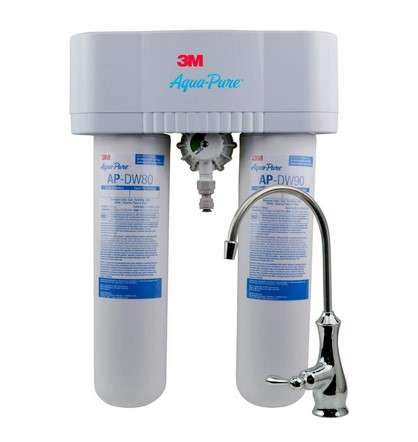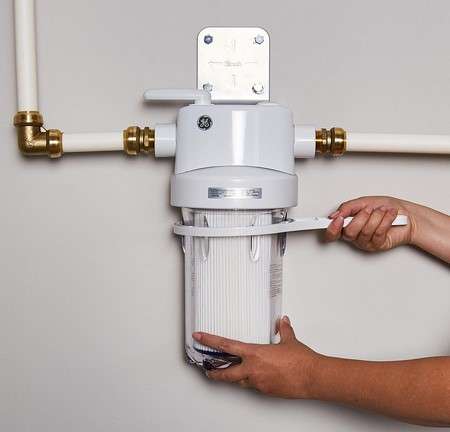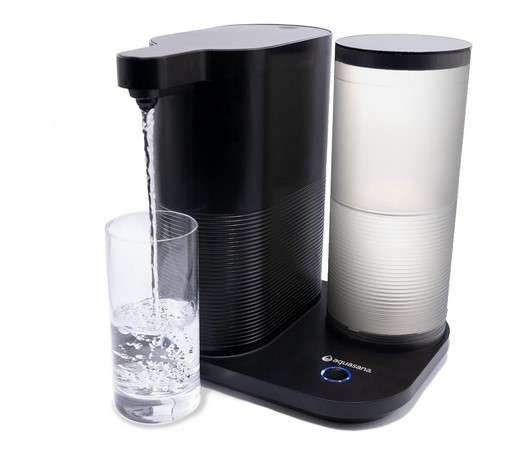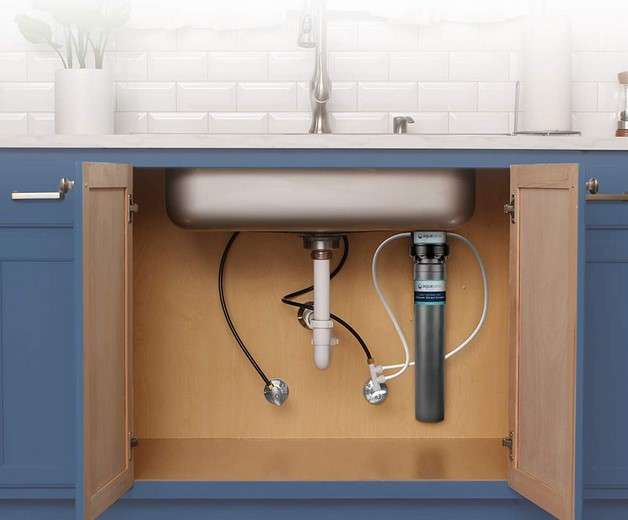When it comes to choosing the ideal water filter for your bathtub faucet, it’s crucial to tailor your decision to the unique requirements of your household. Even with a standard bathtub faucet, there’s a myriad of factors to contemplate when picking the right water filter.
This comprehensive guide is your roadmap to selecting the ultimate water filter for your bathtub faucet. We’ll explore the various water filter types available, delve into the essential features you should look for, and recommend top-notch models to ensure your bathing experience is nothing short of exceptional.
Types of Water Filters for a Bathtub Faucet
In your quest to secure the best water filter for your bathtub faucet, you’ll encounter several types, each with its own distinct advantages and drawbacks. The suitability of each type largely depends on your household’s unique needs.
Let’s explore the four primary types of water filters for bathtub faucets:
1. Whole-House Water Filters
Whole-house water filters are the apex of water filtration systems, operating at the point where water enters your home. This type of filtration is perfect for households seeking a constant supply of clean, filtered water throughout their entire dwelling. Be prepared for a higher upfront cost compared to other options, as well as the need for professional installation.
2. Faucet-Mounted Water Filters
Faucet-mounted water filters are the most common choice for bathtub faucets. These filters attach directly to the faucet and are a breeze to install and replace. They offer a cost-effective solution, filtering water exclusively for the connected faucet, making them ideal for space-conscious households.
3. Countertop Water Filters
Countertop water filters provide an aesthetically pleasing and permanent water filtration solution. These filters sit atop your countertop and are compatible with any sink in your home. Keep in mind that they come with a higher price tag compared to other options and typically require professional installation.
4. Under-Sink Water Filters
For those seeking a discreet and convenient water filtration system, under-sink water filters are an excellent choice. These filters connect directly to the plumbing beneath your sink, offering versatility across all sinks in your home. However, similar to countertop filters, they come at a higher price point and necessitate professional installation.
The Best Water Filter for a Bathtub Faucet: Our Top Picks
With a comprehensive understanding of what to seek in a bathtub faucet water filter, let’s unveil our top picks to help you make a well-informed choice:
1. AquaPure AP-DWS1000 Faucet-Mounted Water Filter

The AquaPure AP-DWS1000 is the quintessential choice for households in search of a faucet-mounted water filter. Designed to effortlessly attach to your faucet, this filter provides a robust flow of up to 0.5 gallons of filtered water per minute.
It boasts an impressive filter capacity of 2,000 gallons and employs a cutting-edge 3-stage filtration system to reduce contaminants such as chlorine, lead, and sediment.
2. GE Whole-House Water Filter System

For those with a preference for whole-house water filtration, the GE Whole-House Water Filter System stands as an impeccable choice. This system purifies all water entering your home and offers a substantial flow rate of up to 10 gallons of filtered water per minute.
With a colossal filter capacity of 500,000 gallons, it employs a sophisticated 5-stage filtration system to eliminate contaminants like chlorine, lead, and sediment.

3. Aquasana Countertop Water Filter System

If your heart is set on a countertop water filter, the Aquasana Countertop Water Filter System is your perfect match. This filter effortlessly attaches to your countertop, delivering a steady flow of 0.5 gallons of purified water per minute.
It boasts a commendable filter capacity of 1,500 gallons and uses a precise 2-stage filtration system to eradicate contaminants such as chlorine, lead, and sediment.

4. Aquasana Under-Sink Water Filter System

Households seeking a discreet under-sink water filtration system should look no further than the Aquasana Under-Sink Water Filter System. This filter seamlessly connects to your plumbing beneath the sink, offering a consistent flow of 0.5 gallons of filtered water per minute.
With a filter capacity of 600 gallons, it employs an advanced 3-stage filtration system to combat contaminants such as chlorine, lead, and sediment.

Important Features to Look for When Choosing a Water Filter
As you embark on your journey to find the perfect water filter for your bathtub faucet, certain key features should guide your selection. These essential features will ensure you make an informed choice:
- Filter Capacity
The filter capacity of a water filter is a vital consideration as it indicates how much water the filter can purify before needing replacement. Opting for a higher filter capacity means less frequent filter changes, saving you both time and money in the long run.
- Flow Rate
The flow rate of a water filter is another critical factor, highlighting how quickly the filter can process water. A higher flow rate guarantees swift access to clean, filtered water, a significant advantage for households with multiple occupants.
- Filter Type
The filter type is of paramount importance, as different technologies yield varying levels of filtration. Common filter types include carbon, ceramic, and reverse osmosis, each with its unique set of advantages and disadvantages.
- Cost
The cost of a water filter plays a substantial role in your decision-making process, potentially impacting your budget. Generally, whole-house and under-sink filters are the more expensive options, while faucet-mounted and countertop filters are budget-friendly alternatives.
In Conclusion
Selecting the best water filter for your bathtub faucet is a nuanced process, and it hinges on numerous factors. The four primary water filter types encompass whole-house, faucet-mounted, countertop, and under-sink solutions. When making your choice, always consider filter capacity, flow rate, filter type, and cost.
To ensure your bathing experience is top-notch, our top recommendations include the AquaPure AP-DWS1000 Faucet-Mounted Water Filter, the GE Whole-House Water Filter System, the Aquasana Countertop Water Filter System, and the Aquasana Under-Sink Water Filter System. Your journey to pure, refreshing bathwater begins here.
What are the advantages of using a water filter for a bathtub faucet?
Certainly, using a water filter for your bathtub faucet offers a multitude of advantages, enhancing not only your bathing experience but also your overall well-being. Here’s a comprehensive overview of the benefits:
Improved Water Quality:
Water filters effectively remove impurities such as chlorine, heavy metals, and sediments, ensuring that the water flowing from your bathtub faucet is cleaner, fresher, and safer to bathe in.
Healthier Skin and Hair:
Filtering out harmful chemicals and contaminants from your bathing water can help prevent skin irritations, dryness, and promote healthier hair. Your skin will feel smoother, and your hair will be shinier and more manageable.
Enhanced Respiratory Health:
By reducing the presence of chlorine in the water, water filters can also improve the air quality in your bathroom. This can lead to easier breathing, especially for those with asthma or sensitive respiratory systems.
Prolonged Appliance Lifespan:
The removal of minerals and sediments can prevent the buildup of scale in your bathtub and other appliances, such as the water heater. This prolongs their lifespan and reduces the need for maintenance.
Economical:
Water filters can be more cost-effective in the long run compared to purchasing bottled water for bathing, which can quickly add up. Additionally, the reduced wear and tear on appliances can save you money on repairs and replacements.
Eco-Friendly:
Reducing the need for plastic bottled water contributes to a more sustainable environment. Using a water filter is a responsible choice that decreases plastic waste and carbon footprint.
Consistent Water Pressure:
A clean filter ensures that your bathtub faucet maintains a consistent water pressure, allowing for a more enjoyable and uninterrupted bathing experience.
Taste and Odor Improvement:
Water filters also improve the taste and odor of the water, making your baths more enjoyable and refreshing.
Customized Filtration:
You can choose a water filter system that meets your specific needs, whether it’s focusing on removing chlorine, sediment, heavy metals, or a combination of these. This customization ensures that you get the exact water quality you desire.
Peace of Mind:
Knowing that your bathing water is free from harmful contaminants can provide peace of mind and a sense of security, especially if you have concerns about the quality of your local water supply.
In summary, using a water filter for your bathtub faucet is a wise investment in your health, comfort, and the environment. It offers a comprehensive solution to enhance your bathing experience by delivering cleaner, healthier water while also contributing to a more sustainable and cost-effective lifestyle.
How does a water filter for a bathtub faucet work?
A water filter designed for a bathtub faucet is a clever and efficient device that operates on a straightforward yet highly effective principle. Its primary function is to improve the quality of the water that flows from your faucet, ensuring that it is cleaner, safer, and more enjoyable for your bathing and showering experience.
The inner workings of a bathtub faucet water filter can be broken down into a few key steps:
Inflow and Preliminary Filtration:
When you turn on your bathtub faucet, water flows from your plumbing into the filter. The first stage involves a preliminary filtration step, which typically utilizes a mesh or fine screen to trap larger particles such as sediments, rust, and debris. This initial layer ensures that only relatively clean water continues to the next phase.
Activated Carbon or Filter Media:
The heart of the water filter is the activated carbon or another filtering media. This is where the real magic happens. The water passes through a dense bed of activated carbon or specialized media, which are designed to adsorb or trap impurities.
This includes common contaminants like chlorine, heavy metals, organic compounds, and even some bacteria and microorganisms. The activated carbon works by chemically binding with these impurities, effectively removing them from the water.
Fine Filtration:
After the activated carbon or filter media has done its job, the water may pass through an additional fine filtration stage. This step further refines the water quality by capturing any remaining particles or contaminants that managed to bypass the previous stages.
Delivery of Clean Water:
Once the water has gone through the filtration process, it is released from the filter and flows out of your faucet in a much cleaner, safer, and more pleasant state. This water is free from the unpleasant taste and odor often associated with tap water, making it ideal for bathing, showering, and other water-related activities.
In summary, a water filter for a bathtub faucet works by employing a multi-stage filtration process to remove impurities, improve water quality, and ensure a more enjoyable bathing experience.
By utilizing activated carbon or specialized filter media, it effectively rids the water of unwanted elements, leaving you with purer, cleaner water for your daily hygiene and relaxation needs.
Can a water filter effectively remove chemicals and impurities from the water used in a bathtub?
A water filter’s effectiveness in purifying the water used in a bathtub depends on several factors. Water filters are designed to remove impurities and chemicals from water, but their performance can vary depending on the type of filter and the specific contaminants present in the water.
Type of Water Filter:
There are various types of water filters, such as activated carbon filters, reverse osmosis systems, and UV purifiers. Each has its own set of capabilities when it comes to removing specific contaminants. It’s crucial to select a filter that is designed to target the impurities commonly found in your water source.
Contaminant Types:
The effectiveness of a water filter depends on the types of contaminants present in your water. Water in different regions can contain varying levels of minerals, sediments, chlorine, heavy metals, and even microbial pathogens. Some filters excel at removing specific contaminants, while others offer more comprehensive purification.
Flow Rate:
Bathtubs require a significant amount of water, so the flow rate of your chosen water filter is important. You’ll want a filter that can handle the water volume without compromising its efficiency. A filter with a slower flow rate might not be ideal for filling a bathtub in a reasonable time.
Filter Maintenance:
Regular maintenance is key to ensuring the consistent performance of your water filter. Filters need to be replaced or cleaned periodically, depending on the type. Neglecting maintenance can reduce the filter’s ability to remove impurities effectively.
Cost and Convenience:
Different filters come with varying costs and installation complexities. Some are easy to install on a bathtub faucet, while others might require professional installation. Consider your budget and how much you’re willing to invest in water purification.
Water Quality Testing:
It’s a good practice to test your water quality before choosing a filter. This will help you identify the specific impurities in your water and select a filter that’s tailored to your needs.
In conclusion, while water filters can be effective in removing chemicals and impurities from bathtub water, the success of this process depends on the filter type, the contaminants present in your water, flow rate, maintenance, and your budget. It’s essential to choose the right filter for your unique situation to ensure that your bathwater is as pure and clean as possible.
Are water filters for bathtub faucets easy to install and maintain?
Installing and maintaining water filters for bathtub faucets can be a straightforward and hassle-free endeavor, provided you select the right filter system and follow the recommended guidelines. The ease of installation and maintenance primarily depends on the specific type of filter you choose.
Most water filter systems designed for bathtub faucets are designed with user-friendliness in mind. They often feature a universal fit that can be attached to the faucet with minimal tools or expertise required. Here are some general steps to guide you through the process:
Choose the Right Filter: To ensure ease of installation and maintenance, select a filter system compatible with your bathtub faucet. There are various designs available, such as screw-on filters or those that simply attach to the faucet head.
Prepare Your Tools: Generally, the only tool you may need is an adjustable wrench or pliers. Some filter systems might come with their own specialized tools.
Installation Steps: The exact installation steps can vary depending on the filter model, but typically involve:
- Unscrewing the aerator or existing attachment from the faucet.
- Ensuring the rubber gasket or washer is in place to prevent leaks.
- Connecting the water filter to the faucet by screwing it on or securing it as per the instructions provided.
- Checking for any leaks and ensuring a tight seal.
Regular Maintenance: Maintenance for most bathtub faucet water filters is minimal. It involves changing the filter cartridge or the entire filter unit at regular intervals, which is usually recommended by the manufacturer. This ensures the filter continues to effectively remove impurities from your water.
Filter Replacement: Replacing the filter is a simple process, typically requiring unscrewing the old filter cartridge and installing a new one. The frequency of replacement depends on the specific filter and water quality in your area.
Maintenance Check: Regularly inspect your filter for any signs of wear and tear, as well as for leaks. Ensure that connections are tight and that the filter is functioning properly.
In summary, water filters for bathtub faucets are generally easy to install and maintain, offering an effective solution to improve water quality in your bath. The level of ease, however, depends on the specific filter system you choose.
It’s essential to follow the manufacturer’s instructions to ensure a trouble-free installation and a consistent performance. With proper care and maintenance, you can enjoy the benefits of cleaner and safer bathwater with minimal effort.
What are some popular and highly recommended brands of water filters for bathtub faucets?
When it comes to selecting a water filter for your bathtub faucet, there are several popular and highly recommended brands known for their quality and effectiveness in providing clean, safe water for bathing.
Here’s a list of some of these top brands:
- Aquasana: Aquasana is renowned for its innovative filtration technology, ensuring that your bathwater is free from contaminants, such as chlorine, heavy metals, and organic chemicals. Their filters are easy to install and maintain.
- Culligan: Culligan has a strong reputation for water treatment solutions, and they offer bathtub faucet filters that remove impurities and enhance water clarity. Their filters are often praised for improving skin and hair health.
- Pelican Water: Pelican Water offers a range of bathtub faucet filters designed to eliminate chlorine, chloramines, and other harmful substances from your bathwater. Their systems are easy to install and durable.
- Sprite: Sprite specializes in shower and bath filtration, with a focus on chlorine removal. Their bathtub faucet filters are simple to attach and offer great results in terms of water quality and skin benefits.
- Woder: Woder provides cost-effective and efficient bathtub faucet filters that effectively reduce chlorine, heavy metals, and other contaminants, providing you with a safe and refreshing bathing experience.
- AquaBliss: AquaBliss offers user-friendly bathtub faucet filters that improve water quality and help in maintaining healthier skin and hair. They are known for their affordability and effectiveness.
- Luxury Filtered Shower: This brand is known for its high-capacity filters, which ensure long-lasting performance and offer excellent water purification. Their bathtub faucet filters are trusted for delivering a spa-like bathing experience.
- Whedon: Whedon produces water-saving bathtub faucet filters that provide a balanced mix of water conservation and improved water quality. These filters are eco-friendly and reduce water consumption.
- Geysa: Geysa is a reliable brand known for its advanced filtration technology that removes chlorine and other impurities. Their bathtub faucet filters are designed for easy installation and maintenance.
- Jonathan Product: Jonathan Product focuses on eco-conscious bathtub faucet filters that enhance water quality and minimize the use of harmful chemicals, ensuring a more sustainable bathing experience.
When choosing a water filter for your bathtub faucet, consider your specific water quality concerns and budget, as well as the ease of installation and maintenance. These reputable brands offer a variety of options to suit different needs, making it easier for you to enjoy clean and refreshing baths while taking care of your skin and overall well-being.
Do bathtub faucet filters affect water pressure during a shower or bath?
Bathtub faucet filters are a valuable addition to your plumbing system, as they offer the benefit of cleaner and safer water for your showers and baths. However, many people wonder whether these filters can have an impact on water pressure, a crucial factor in determining the quality of your bathing experience.
The short answer is that bathtub faucet filters can indeed affect water pressure, but the extent of this impact varies depending on the type of filter you choose and the condition of your plumbing system.
Here’s a more comprehensive look at how these filters may influence water pressure:
- Filter Type: The choice of faucet filter matters. High-quality faucet filters are designed to maintain water pressure while effectively removing contaminants. They come with advanced filtration technologies that ensure water pressure remains consistent during your shower or bath. Cheaper, low-quality filters may restrict water flow and reduce pressure, so investing in a reputable filter is essential.
- Plumbing Condition: The condition of your plumbing system plays a significant role. If your pipes are old and corroded or if you have low water pressure issues to begin with, adding a filter might further reduce the pressure. In such cases, it’s advisable to consult a plumber to assess and possibly upgrade your plumbing system.
- Filter Maintenance: Regular maintenance of your faucet filter is key. Neglected filters can accumulate debris, mineral deposits, and contaminants, leading to decreased water pressure. Make sure to clean or replace your filter as recommended by the manufacturer to prevent pressure issues.
- Flow Rate: Some faucet filters have adjustable flow rates, allowing you to customize the water pressure to your preference. If maintaining high water pressure is crucial to you, look for filters with adjustable settings to ensure a comfortable shower or bath.
In conclusion, bathtub faucet filters can affect water pressure, but the impact depends on the filter type, your plumbing condition, and maintenance. Investing in a quality filter, keeping your plumbing system in good shape, and practicing regular filter maintenance will help ensure that you enjoy clean water without sacrificing your shower or bath’s water pressure.
What is the difference between faucet-mounted filters and in-line filters for bathtubs?
Faucet-Mounted Filters:
Faucet-mounted filters are compact and convenient filtration systems designed primarily for use in sinks or, more specifically, for filtering water at the point of use.
As the name suggests, they attach directly to the faucet or tap, allowing you to filter water as it flows out for immediate consumption. These filters are typically employed in kitchens and bathrooms, particularly for drinking and handwashing purposes.
Key characteristics of faucet-mounted filters:
Installation: These filters are incredibly easy to install and usually require no tools. They connect directly to the faucet, with a switch to toggle between filtered and unfiltered water.
Filtration: Faucet-mounted filters typically use a combination of activated carbon and other media to remove common contaminants like chlorine, sediment, and odors. They are efficient at improving the taste and odor of water.
Application: They are ideal for small-scale water purification tasks such as drinking, cooking, and teeth brushing. They are not suitable for filtering larger quantities of water, like filling a bathtub.
In-Line Filters for Bathtubs:
In-line filters for bathtubs are larger and more robust filtration systems designed to handle the demands of bathing and, to some extent, showering. Unlike faucet-mounted filters, they are installed in the plumbing system, usually near the water source, offering comprehensive filtration for the entire bathing experience.
Key characteristics of in-line filters for bathtubs:
Installation: These filters require a bit more effort to install as they need to be integrated into the plumbing system. Professional installation may be necessary in some cases.
Filtration: In-line filters for bathtubs employ a multi-stage filtration process, including activated carbon and other technologies, to remove a wide range of impurities, including chlorine, heavy metals, sediment, and microorganisms. This results in a significant improvement in water quality for bathing, leading to softer skin and healthier hair.
Application: They are specifically designed to enhance the water quality during baths, reducing the negative effects of chlorine and other contaminants on the skin and hair. Some models also work for shower water, providing a more luxurious bathing experience.
In summary, faucet-mounted filters are perfect for point-of-use filtration, such as drinking and cooking, while in-line filters for bathtubs are tailored for comprehensive water purification during bathing.
The choice between them depends on your specific needs and whether you’re looking to improve the quality of water for small-scale tasks or seeking a spa-like experience in your bathtub or shower.
Do these filters also address hard water issues or scale buildup in bathtubs?
When it comes to the subject of water quality and its impact on your bathtub, it’s important to understand that filters primarily designed for drinking water purification might not be the most effective solution for addressing hard water issues or scale buildup in bathtubs. Let me explain why.
Water filters used for drinking water are typically optimized to remove contaminants like sediments, chemicals, and microorganisms that may affect the taste and safety of the water you consume.
These filters are not specifically designed to deal with the issues caused by hard water, which is characterized by a high mineral content, primarily calcium and magnesium ions. Hard water can lead to limescale or mineral deposits building up in your bathtub, faucets, and other plumbing fixtures over time.
To address hard water issues and scale buildup in bathtubs, you may want to consider water softeners or whole-house water filtration systems. Water softeners use ion exchange technology to reduce the concentration of calcium and magnesium ions in your water, preventing the formation of limescale. Meanwhile, whole-house water filtration systems are designed to remove minerals and impurities, providing improved water quality throughout your home.
In conclusion, while water filters play a vital role in ensuring clean and safe drinking water, they may not be the best solution for combatting hard water problems or scale buildup in bathtubs. For these specific issues, water softeners and whole-house filtration systems are more effective options to consider.

